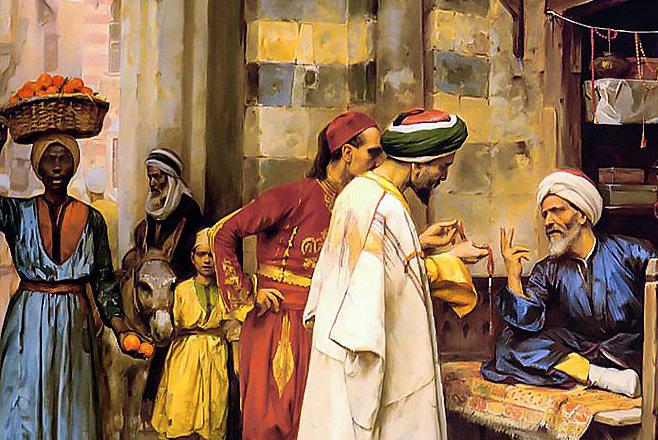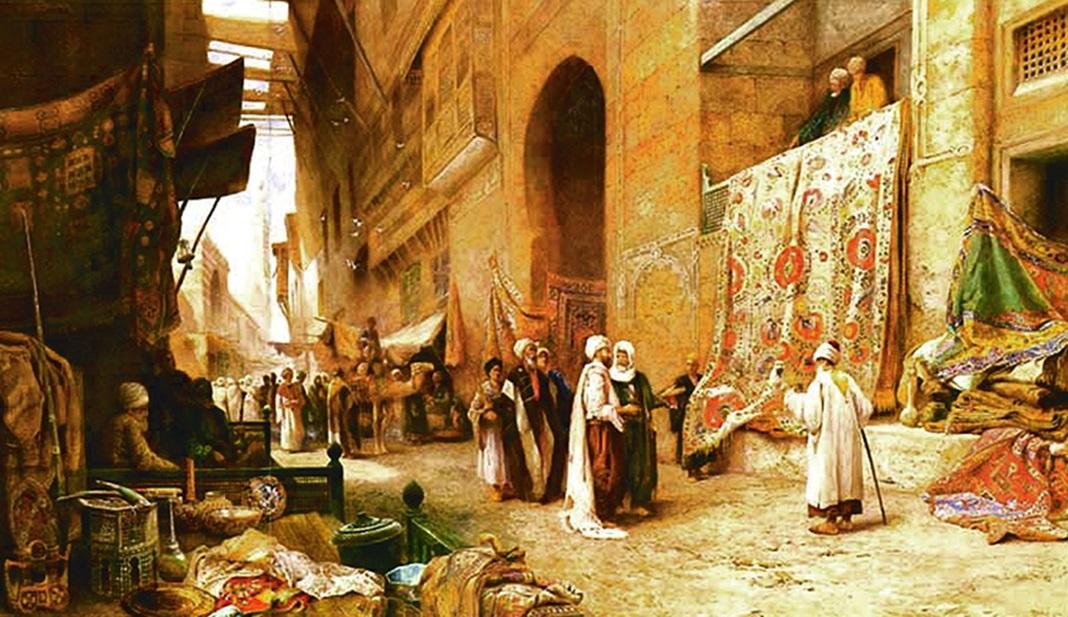The following is an excerpt from Imam al-Ghazali’s book, Kitāb Ādāb al-Kasb wal-Maʿāsh (The Book on the Morals of Earning and Living), translated by Prof. Adi Setia, and slightly edited for publishing on Muslim Ink. It lists the virtues of working and halal earning in the Islamic tradition.
Virtues mentioned in the Qur’an
Allah mentions in the Qur’an, “And We have made the day for livelihood” (Qur’an, 78:11). He mentioned this ayah in the context of exhibiting His blessings [on humankind]. In another ayah, “And We have established you on earth and provided you a means of livelihood thereon. Little are you grateful” (Qur’an, 7:10).
Thus Allah has made livelihood a blessing and demanded gratitude for it.
Allah says, “It is no crime for you to seek bounty from your Lord” (Qur’an, 2:198), “…And others traveling the land seeking the bounty of Allah” (Qur’an, 73:20), “Then disperse through the land and seek the bounty of Allah” (Qur’an, 62:10).
Virtues mentioned in the Sunnah
As for what is from the Prophetic reports (al-akhbār), verily the Prophet ﷺ has said, “Of the sins, there are sins for which nothing can atone except vexation in seeking a living.” [At-Ṭabarānī in al-Awsaṭ, Abū Nuʿaym in al-Ḥilya (Itḥāf 6:251)]
The Prophet ﷺ said, “The honest merchant (al-tājir alṣadūq) is resurrected on Judgment Day with the truthful and the martyrs.” [At-Tirmidhī, al-Ḥākim, Ibn Mājah (Itḥāf 6:251)]
He ﷺ also said, “Whosoever seeks the world lawfully in order to refrain from asking, to work for [the provisioning of] his dependents and to show compassion to his neighbor, shall meet Allah with his face like the moon on the night when it is full.” [Abū al-Shaykh in al-Thawāb, Abū Nuʿaym in al-Ḥilya, al-Bayhaqī in Shuʿayb al-īmān (Itḥāf 6:252)]
The Prophet ﷺ was sitting one day with his Companions, and they observed a strong, sturdy youth setting out early to work. They said, “Woe unto this man; would it that his youth and strength were spent in the path of Allah.” The Prophet ﷺ said, “Do not say this; for if he works for himself in order to restrain himself from begging and to be independent of people, then he is in the path of Allah. If he works for his impoverished parents or for his impoverished children so as to enrich and suffice them, then he is in the path of Allah. If [however] he works for the sake of showing off and accumulation [of wealth], then he is in the path of Satan.” [At-Ṭabarānī in his three Maʿājim (Itḥāf 6:252)]
The Prophet ﷺ said, “The honest merchant (al-tājir alṣadūq) is resurrected on Judgment Day with the truthful and the martyrs.” [At Tirmidhi]
He ﷺ said, “Verily, Allah loves the servant who adopts a trade in order to be independent through it of people, and He dislikes a person who learns knowledge in order to adopt it as a trade.” [Al-ʿIrāqī says he did not find the hadith in this wording; however, Abū Manṣūr ad-Daylamī narrates in Musnad al-Firdaws a hadith of ʿAlī that Allah loves to see His servant worn out in seeking the lawful (Itḥāf 6:253)]
In one narration, “Verily, Allah Most High loves the gainfully employed believer[1] (al-muʾmin al-muḥtarif).” [Al-Ṭabarānī and ibn ʿAdī (Itḥāf 6:253)]
The Prophet ﷺ said, “The most lawful of what a person eats is from his own work, and [from] every pious sale (bayʿ mabrūr).” [Aḥmad, al-Bazzār, al-Ḥākim, al-Bayhaqī (Itḥāf 6:253)]
In another report, “The most licit of what the servant eats is [out of] the work of his vocation when he acts in good faith (naṣaḥa).” [Aḥmad (Itḥāf 6:254)]
The Prophet ﷺ said, “Hold fast to commerce (al-tijāra) for indeed it constitutes nine tenths of sustenance (al-rizq).” [Ibrāhīm al-Ḥarbī in Gharīb al-Ḥadīth (Itḥāf 6:254)]
It has been narrated that ʿĪsā (Jesus) (peace be upon him) met a man and he said, “What do you do?” The man said, “I worship.” He said, “Who provides for you?” The man said, “My brother.” He said, “Your brother is more worshipful than you.” [Cited in al-Makkī, Qūt al-Qulūb (Itḥāf 6:255)]
[Also read: Lost your job? Don’t lose hope]
Virtues mentioned by the Sahabah and Salaf-us-Saalih
As for the traditions (al-āthār), Luqmān al-Ḥakīm said to his son, “O my son, seek independence from poverty through lawful earning, for indeed, not a single person becomes impoverished except that he is afflicted by three traits: vulnerability in his religion, weakness in his intelligence, and loss of his dignity. And what is greater than these three is people’s belittling of him.”
ʿUmar [ibn al-Khaṭṭāb] (may Allah be pleased with him) said, “None of you should sit unoccupied with seeking sustenance and say, ‘O my Lord, give me sustenance,’ for you are well aware that the sky does not rain down gold or silver.” [Cited in al-Makkī, Qūt al-Qulūb (Itḥāf 6:257)]
Zayd ibn Maslama[2] used to cultivate his land, and ʿUmar (may Allah be pleased with him) said to him, “You are doing the right thing. Be independent of people for that will be more protective of your religion and more munificent of you in respect of them…”
Ibn Masʿūd (Allah be pleased with him) said, “Indeed I detest seeing a person idling, neither occupied with his worldly nor after worldly concerns.”
Ibrāhīm [al-Nakhaʿī] was asked about the truthful merchant (al-tājir al-ṣadūq) as to whether such a person was more to his liking than one exclusively devoted to worship (al-mutafarrigh lil-ʿibāda). He answered, “The truthful merchant is more to my liking for he is in exertion (jihād). Satan comes to [tempt] him through the avenue of measuring and weighing, and through taking and giving, but [despite all that] he strives against him.” However, al-Ḥasan al-Baṣrī differs with him on that issue.
ʿUmar [ibn al-Khaṭṭāb] (Allah be pleased with him) said, “There is not a place through which death enters that is more beloved to me than an abode (mawṭin) in which I ply my trade in the market (atasawwuq), buying and selling for the sake of my family.”
Al-Haytham[3] said, “It may be that I come to know of a person speaking bad about me (yaqaʿu fiyya), but then I recall my independence of him and thus it becomes light on me.”
Ayyūb[4] said, “A work in which there is some [small] gain is more to my liking than asking of people.”
A violent gale occurred at sea and the people on the ship said to Ibrāhīm ibn Adham (Allah have mercy on him) who was with them on the ship, “Do you not reckon this to be hardship?” He said, “This is not hardship (al-shidda). Verily hardship is to be in need of people.”
Ayyūb said, “Abū Qilāba[5] said to me, ‘Frequent the market, for independence is part of wellbeing (al-ghinā min al-ʿāfiya).’”
[1] One who has acquired a skill, trade, or profession and is practicing it.
[2] Following Qūt al-Qulūb, al-Zabīdī says that this person was actually Muḥammad ibn Maslama ibn Salama al-Anṣārī, a famous Companion who died after 40H (Itḥāf 6:258).
[3] Ibn Jamīl al-Baghdādī of Antioch, a trustworthy scholar of hadith (Itḥāf 6:259).
[4] Ibn Tamīma al-Sakhtiyānī al-Baṣrī (Itḥāf 6:259)
[5] ʿAbdullāh ibn Zayd ibn ʿAmr al-Jaramī al-Baṣrī (Itḥāf 6:259)








 Dr. Bilal Philips
Dr. Bilal Philips